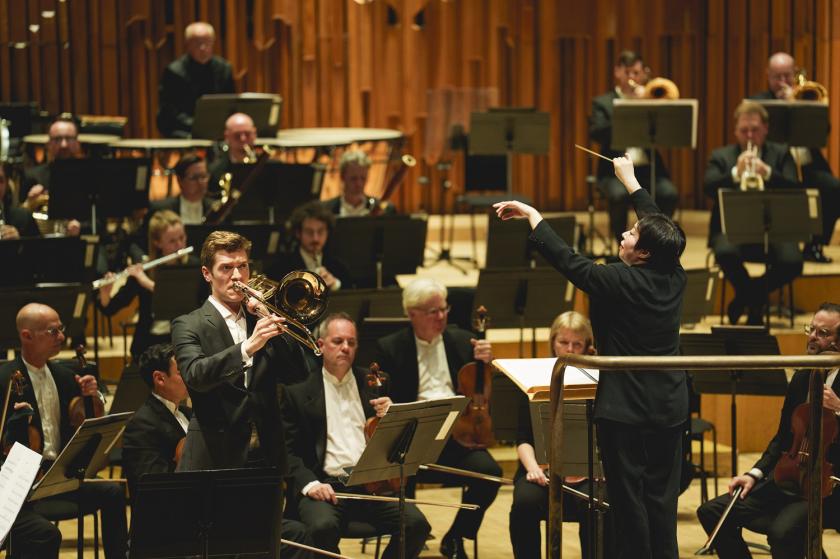Xian Zhang is clearly a versatile conductor. In this concert, with the London Symphony Orchestra, she presented a fascinating strings work by Chinese composer Qigang Chen and a new trombone concerto by Dani Howard, all framed with favourites from Ravel and Stravinsky. Zhang is from China herself, and mostly works in the US, but she will be known to UK audiences from her time as principal guest conductor of the BBC NOW, and for occasional appearances with English and Welsh National Operas.
A keen ear for detail was apparent from everything that Zhang conducted in this diverse programme. She has a strong baton technique, and her tempos are disciplined. In Ravel’s Mother Goose Suite, the mood and texture of each short movement was immediately established. Phrasing was supple but discreet, and contrasts were kept to a minimum. Zhang let Ravel’s subtle orchestral textures do all the talking, and she clearly knew that she could rely on the woodwind soloists to carry the elegant lines.  The Ravel was a curiously understated opener, but it fed smoothly into the trombone concerto that followed. The concerto was written by Dani Howard for Peter Moore, principal trombone of the LSO (both composer and soloist are still in their 20s). Howard’s orchestration is in the same spirit as Ravel’s, exploring connections between colours, and gradually merging and separating the groups. The piece was written during lockdown and premiered by the Royal Liverpool Philharmonic, who commissioned it, in the summer of 2021. Howard writes that the music was inspired by the key workers who laboured through those times, and whose dedication she wanted to celebrate.
The Ravel was a curiously understated opener, but it fed smoothly into the trombone concerto that followed. The concerto was written by Dani Howard for Peter Moore, principal trombone of the LSO (both composer and soloist are still in their 20s). Howard’s orchestration is in the same spirit as Ravel’s, exploring connections between colours, and gradually merging and separating the groups. The piece was written during lockdown and premiered by the Royal Liverpool Philharmonic, who commissioned it, in the summer of 2021. Howard writes that the music was inspired by the key workers who laboured through those times, and whose dedication she wanted to celebrate.
Accordingly, the work opens with an invocation of everyday life, a gentle background hubbub, reminiscent of the opening of Vaughan Williams’s A London Symphony. The trombone enters, and then plays almost continuously for the remainder of the three-movement work. The trombone's long, lyrical lines form the basis of the textures beneath. Confrontation is rare, instead the trombone leads the ensemble through a variety of sounds and textures. That approach is ideal for Peter Moore, who has a warm lyrical tone which he can maintain over long stretches. At the start of the final movement, he discreetly changed to a smaller mouthpiece for some high passagework. Here, he finally gets a chance to show off his chops, but the movement is also a colourful orchestral showpiece, and builds to a powerful conclusion.
 L’Éoignement is a 2003 string orchestra work by Qigang Chen (pictured left, image Boosey & Hawkes). Chen began his studies in China, but in the mid-'90s moved to Paris to study with Messiaen. The liner notes, by Timmy Fisher, trace a spiritual and stylistic journey across Chen’s career, with the Modernism of his earlier music gradually giving way to a style based explicitly on Chinese folk music. That tension plays out in microcosm in L’Éoignement. It begins with dramatic, percussive textures, innovative but clearly based on pentatonic harmonies. As the work goes on, the Chinese folk tune Zou Xi Kou gradually emerges. The most direct statements of the theme tend toward the schmalzy and sentimental – though I bet Messiaen would have loved them – but even here the textures beneath are complex and subtle. The work is surprisingly challenging for the players, with fast hocket between the violins, and high harmonic effects in the cellos. The LSO strings rose to every challenge, bringing clarity and focus.
L’Éoignement is a 2003 string orchestra work by Qigang Chen (pictured left, image Boosey & Hawkes). Chen began his studies in China, but in the mid-'90s moved to Paris to study with Messiaen. The liner notes, by Timmy Fisher, trace a spiritual and stylistic journey across Chen’s career, with the Modernism of his earlier music gradually giving way to a style based explicitly on Chinese folk music. That tension plays out in microcosm in L’Éoignement. It begins with dramatic, percussive textures, innovative but clearly based on pentatonic harmonies. As the work goes on, the Chinese folk tune Zou Xi Kou gradually emerges. The most direct statements of the theme tend toward the schmalzy and sentimental – though I bet Messiaen would have loved them – but even here the textures beneath are complex and subtle. The work is surprisingly challenging for the players, with fast hocket between the violins, and high harmonic effects in the cellos. The LSO strings rose to every challenge, bringing clarity and focus.
The concert ended with Stravinsky’s Firebird Suite, in the shorter but punchier 1919 version. Xian Zhang presented the suite as a single, concise musical statement. From the start, tempos were brisk, although the mystery of the opening was beautifully conveyed. (Unfortunately for Qugiang Chen, the harmonic glissandos in the cellos that ended his work appeared again soon after in the opening of the Stravinsky, his inspiration made painfully obvious.) The woodwind soloists got another chance to shine, particularly oboist Oliver Stankiewicz in the Round Dance and bassoonist Daniel Jemsion in the Berceuse. Zhang pushed the "Infernal Dance" particularly hard, leading to some ragged ensemble from the lower brass. But the Finale was more successful, round and broad, but brought to a brisk, emphatic conclusion under Zhang’s disciplined baton.













Add comment